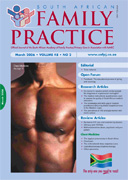Feedback: The educational process of giving and receiving
Abstract
The report of the Standing Committee on Postgraduate Medical Education in the United Kingdom stated in 1995 1 that “all those involved in teaching can contribute by creating a positive educational environment, helping learners to achieve their goals by providing support and constructive feedback… They need to understand more about the need for, and the ways of achieving feedback, appraisal, openness and trust. Over a number of years, many surveys have shown that a lack of feedback is the most common complaint students, interns and registrars make about their teaching and training. In many ways it is the most serious, for feedback is essential to progression in learning. The purpose of this article is to describe the concept of feedback, its triangulation with effective teaching and learning and to demonstrate its potential in maximising any teaching activity that is encountered within practice. It will also explore how, because of its close proximity to appraisal, feedback may provide personal drive and motivation. “Think like a wise man but communicate in the language of the people. William Butler Yeats1 (SA Fam Pract 2006;48(2): 5-6)
Section
Forum
By submitting manuscripts to SAFP, authors of original articles are assigning copyright to the South African Academy of Family Physicians. Copyright of review articles are assigned to the Publisher, Medpharm Publications (Pty) Ltd, unless otherwise specified. Authors may use their own work after publication without written permission, provided they acknowledge the original source. Individuals and academic institutions may freely copy and distribute articles published in SAFP for educational and research purposes without obtaining permission.

